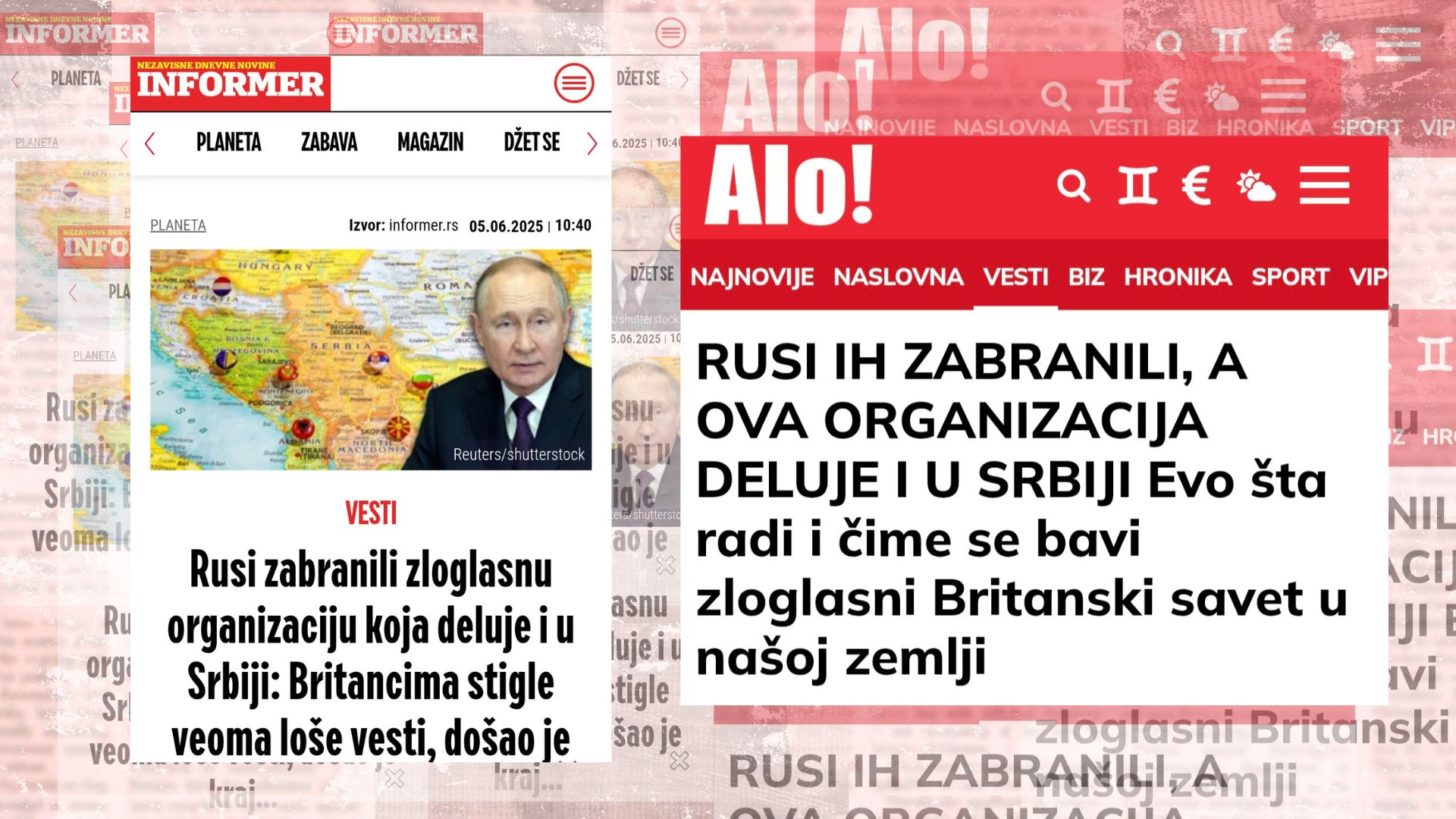Original article (in Serbian) was published on 10/6/2025; Author: Milica Ljubičić
The Russian ban on the British Council was met with jubilation in Serbian tabloids, which immediately labelled the organization as “notorious”. Although it is a global cultural institution that, among other things, organizes English language proficiency testing, for Informer and Alo, the Russian decree was enough to call its credibility into question. Over the past decade, Russia has declared numerous international organizations “undesirable”, including many non-governmental organizations that protect human and LGBT rights, as well as many media outlets.
After the news that the British Council was declared ”undesirable” in Russia, the web portal Alo published that “this organization also operates in Serbia”, adding that they reveal “what the notorious British Council does and what it is engaged in in our country”.
Informer, a pro-Putin-oriented tabloid, similarly states that the British Council is a “notorious organization that operates in Serbia”, and that its end has come.
What is it really about?
As reported by the Moscow Times web portal, the Russian Attorney General accused the British Council a few days ago of “trying to promote British interests under the guise of teaching English and supporting the LGBT movement, which Russia has banned as extremist”.
Russia’s Federal Security Service (FSB), according to Reuters, accused the British intelligence service of using the British Council as a “cover to undermine Russia”. They claim to have identified teachers at leading universities who collaborated with this organization.
On the other hand, the British Council expressed disappointment with this decision and denied any involvement in espionage for the British intelligence service.
Media reports note that relations between London and Moscow were poor even before the war in Ukraine started, and have further worsened since the war began three years ago.
Although Serbian tabloids present a clear negative narrative about the British Council, it is an organization that, for example, has had an office in Serbia since 1940 and, as it states about itself, supports peace and progress by building connections, understanding, and trust among people from the United Kingdom and other countries around the world.
“We uniquely combine expert opinions from the UK in the fields of arts and culture, education and English language, our presence worldwide and connections in over 100 countries, our unparalleled access to youth and influential people, and our creativity”.
Additionally, the British Council is one of the organizers of the International English Language Testing System (IELTS), one of the most widely used English language proficiency exams for non-native speakers. The ban on this organization in Russia, according to Moscow Times sources, could also affect IELTS testing conducted by the British Council.
For example, IELTS results are accepted by the UK Visa and Immigration Service as proof of English language proficiency for people who want to live, work, or study in the UK.
IELTS tests are also taken in Serbia through the British Council.
Although recently declared undesirable in Russia, this organization has offices in as many as 100 countries worldwide, according to its global website.
Since the start of the war in Ukraine, Russia has declared many organizations undesirable and banned their work and activities in the country.
Deutsche Welle reported in mid-2024 that nearly 200 foreign and international organizations in Russia have been designated as undesirable. Among them are the news web portal Meduza, Russian TV channel Dozhd, and the independent web portal Moscow Times.
Immediately after the attack on Ukraine, Russia declared the international investigative journalism network OCCRP undesirable, which gathers dozens of investigative media worldwide, as well as the editorial office of iStories, part of OCCRP, which was based in Moscow. Journalists from that editorial office, led by multiple award-winning investigative journalist Roman Anin, were labelled as “foreign agents”. According to Amnesty International, more than 150 reporters left Russia after the war in Ukraine began due to repression.
Radio Free Europe also ended up on the undesirable list, and the activities of environmental organizations WWF (World Wide Fund for Nature) and Greenpeace were banned. In May this year, Russia also declared Amnesty International, a human rights organization, as “undesirable”.
Russia has a long history of suppressing freedom of speech.
As early as 2012, Russia adopted a law on “foreign agents”, according to which NGOs, media organizations, and individuals funded from abroad who engage in political activities or investigate crime and corruption are declared “foreign agents”. According to OCCRP, they are required to mark everything they publish as the work of a foreign agent and submit financial reports to the Russian Ministry of Justice, or face fines or imprisonment. This law has been amended several times since. The European Court of Human Rights in Strasbourg ruled that this law violates human rights.
Three years later, in 2015, the Russian Duma adopted a law allowing any NGO registered outside Russia to be labelled as an “undesirable organization”.
As Deutsche Welle wrote last year, the law was further tightened so that giving interviews or linking to texts from “undesirable organizations” is punishable.
“For example, anyone who talks to a broadcaster declared undesirable may be prosecuted”, Deutsche Welle notes.



